- Home
- Brian Keene
Darkness on the Edge of Town Page 2
Darkness on the Edge of Town Read online
Page 2
I’m sitting here whistling a tune by Flogging Molly and wishing there was still electricity so I could listen to my iPod. I’d fucking kill to hear some music again—something other than Cranston down on the first floor strumming away on his warped, out-of-tune guitar, or the local juvenile delinquents rapping bad hip-hop to one another around the rusty burn barrel on the sidewalk. Yeah, I could go for some Flogging Molly right now. Or Tiger Army. Or The Dropkick Murphys. A little bit of that would chase the darkness away.
No. No, it wouldn’t. Who the hell am I kidding? Music’s no good. The darkness would just swallow that up, too.
Okay, I’ve stalled long enough, and this whiskey buzz ain’t gonna last forever. If I’m going to tell you about this shit, I suppose I should get down to business. Christy is sleeping in the next room, and Russ is upstairs packing for the trip. We try to avoid one another these days, so that none of us gets angry. We can’t risk turning on one another, and the slightest perceived insult could easily lead to that. See, the darkness amps up our negative emotions. You might not understand that now, but you will.
There’s not much time left. Soon as Christy wakes up, we’re leaving.
Hopefully, we can keep the outer darkness at bay just a little bit longer.
And keep the darkness inside us at bay, as well.
CHAPTER THREE
You know those coming-of-age books and movies? The ones where a bunch of plucky kids have all kinds of adventures during the summer, and it ends up being a major turning point in their lives? They defeat the monster, bully, bad guy, abusive parent, insert your own antagonist here, and afterward, they are changed forever as a result of that confrontation, and when they look back on it as adults, they realize how it shaped and molded them?
Yeah, you know what I’m talking about. I mean, who hasn’t seen one of those movies or read one of those books? We all love that kind of story because we can all identify with it. We’ve all been kids, and we’ve all faced our own monsters.
Here’s the thing about those stories, though. Ninety-nine point nine nine nine percent of the time, they take place in a small town and in a simpler time—usually the fifties or the sixties. Back when things were supposedly more gentle and innocent. I mean, it’s a real slice of Americana, isn’t it? All you need to do is add some baseball and apple pie. Coming-of-age stories are supposed to represent America at its core—everything that is good and decent and moral about us as a nation.
But they’re not really all that accurate anymore, are they? In those stories, everybody knows everyone else in town. People say hello when they pass one another on the street. The town has a real sense of history—the populace knows who founded it and when and why, and all the things that have happened there since. Can you say the same thing about where you live?
Before all of this, Walden wasn’t like that. Yes, we were your stereotypical small town, but we were also a town of strangers. I can count on two hands the number of people I actually knew here. Christy and Russ. Cranston downstairs. My boss at the pizza place and the other delivery drivers. And Dez. But Dez doesn’t count because everyone in Walden knew who he was. You couldn’t miss him. He was the only homeless guy in town—by choice, really. Because of that, everyone knew Dez. He was the exception.
In Walden you didn’t stop and talk to people on the street about the events in your lives. Oh sure, maybe you nodded, acknowledging their presence. Maybe you even commented on the weather or asked for the time of day. But that was all. There was no five-and-dime store selling chocolate malts or comic books off a squeaky spinner rack. No kindly pharmacist dispensing medicine and grandfatherly advice in equal measure. No mom-and-pop stores of any kind because those were a thing of the past. The only things that existed in Walden were the same cardboard-cutout chain stores you found in every other American town—Wal-Mart, Kmart, McDonald’s, Best Buy, Burger King, Staples, Red Lobster, Bath & Body Works, Barnes & Noble, Bass Pro Shops, Target, Subway, and a Starbucks on every corner. That might seem like a lot for a population of just over eleven thousand, but there were other small towns nearby and we’d become their hub. The only independently owned businesses in town, other than the new age health-food store and the comic book shop, were the Lutheran, Methodist, and Catholic churches—and they didn’t see much traffic.
I bet it was the same everywhere in America. Those old coming-of-age stories are a lie.
Fire-hall bean suppers and pancake breakfasts weren’t the hub of social activity, and families didn’t gather around the dinner table or the television because the kids were online and the parents were divorced or working two jobs. At traffic lights, drivers were unknown to the motorists in other cars. A yellow signal meant speed up rather than slow down. Doctors didn’t make house calls because the insurance companies wouldn’t let them. The local waitresses didn’t know their customers’ names or ask them if they wanted the “usual.” Kids didn’t ride their bikes all over town or build forts in the woods because parents didn’t let their kids do things like that anymore. In the twenty-first century, your next-door neighbor was somebody you didn’t know, and they might have been a child molester or a serial killer, so you let your kids stray as far as the backyard, and even then, it was under your watchful eye.
Isn’t it strange? Before the darkness, this was supposed to be the information age. People talked about the planet being a global fucking village. We lived in a world where you could hop online and play chess with some guy in Australia or have virtual sex with a woman you’d never met and never would meet because she lived in Scotland—and maybe, just maybe, she wasn’t even a woman but a dude pretending to be female. But despite breaking down all those social and global barriers, more than ever, we were a nation of strangers. Of secrets. We knew somebody online who we’d never met in person. Knew them by their screen name and their avatar, and called them a friend, but we didn’t know the people who lived next door. We hung out with people on message boards rather than at the bar. We didn’t drop off apple pies when our neighbors were sick or compare lawn-mowing techniques over the white picket fence. We didn’t know what our neighbors were up to behind closed doors or what they were really like in private.
Until the darkness came. Then everybody unmasked. Everybody showed their real faces because it just didn’t matter anymore. And in most cases, their real faces were ugly and monstrous. Not evil. Not really. Evil is too strong of a word. Evil is nothing more than an idea, a moniker we use to describe things that are otherwise indescribable. Anytime we can’t explain a person’s actions, we attribute them to evil. But all the shit that went down after the darkness came—calling it evil would have been too easy. It was brutal and savage, but it wasn’t evil. It was just humans being. Like that? Pretty clever, if I do say so myself. Gallows fucking humor.
But it’s true. All the rapes and murders and arson and everything else that’s happened since the darkness arrived—it was all just humans being human. People reverting back to type. Turning primitive. Devolving back to how we behaved when we were still afraid of the dark. It didn’t happen right away. At first we were all too scared, and we still had hope. But by the first long night, when that hope ran out and all we had left was fear, things went downhill quick.
I can’t tell you what everyone else did because I don’t know their stories. I can only tell you what happened to us. What we saw and heard and experienced ourselves.
In the beginning.
I went to bed late that morning—around three A.M.—because I’d been wrapped up in playing a video game. Christy was in the living room watching Headline News and eating a bowl of cereal. She’d just smoked some weed. I remember drifting off to the smell of her bong smoke wafting into the bedroom from beneath the closed door and the distant drone of the television. One of the anchors was prattling on about ten new fashions or some such bullshit, and I was wondering how that qualified as news. Then I fell asleep.
She woke me a few hours later. I was groggy and grumpy, and it took me a whil
e to actually open my eyes. She kept shaking me, insisting that I get up. When I finally did, I became alert pretty fast. There was something in Christy’s tone that alarmed me. She sounded worried. Not scared. Being scared came later. But she was definitely concerned about something.
I sat up and rubbed my bleary eyes. “What’s wrong?”
“Outside,” she said, breathless. “You’ve got to see it.”
“What?”
“Just hurry!” She jumped up and ran out of the room.
Yawning, I climbed out of bed and scratched my balls. I heard a few car horns honking outside and voices raised in concern, but no sirens or alarms or anything. I sniffed the air but didn’t smell smoke.
“This better be worth it, Christy.”
She didn’t respond.
Our second-floor apartment is pretty small, and there’s not much room between the bed and our dresser. I banged my hip against the side of the dresser and cursed. I hated that fucking thing. I fumbled for the lamp, knocking over an empty beer bottle, an open roll of quarters, and Christy’s incense burner. The coins clattered to the floor and the bottle clinked against the wall. I clicked the lamp’s switch, but nothing happened. Then I noticed the digital clock on the nightstand. It was blank. Not flashing but blank. The power was out. I figured that maybe a car had hit a pole outside our building or something.
I grabbed a pair of sweatpants out of the hamper. Christy had tossed a wet bath towel on top of them. They were damp and smelled musty, but I put them on anyway because they were cleaner than anything else in the apartment. We were overdue for a trip to the Laundromat. I remember that clearly because we never got the chance. We’ve done laundry a few times since then—washing our clothes with dishwashing detergent and a bucket of water from the pond behind the fire company. But that pond is drying up now, and what little water is left in it has grown stagnant and reeks like raw sewage. There’s been no rain since the darkness arrived. Mosquitoes hover around the pond in clouds, and a thin coat of green slime covers the surface. Wearing dirty clothes has become more preferable—at least to those of us who don’t wander the streets naked and howling, like some have taken to doing.
Barefoot, I shuffled out into our tiny living room. Two small candles flickered on the coffee table, filling the apartment with the scent of lilac and lavender. Christy peered out the window. She was wearing one of my old T-shirts and a pair of panties, but she didn’t seem concerned that someone on the street might see her. Her eyes were wide, and her upper lip quivered. One hand was over her breast.
“What’s going on?” I asked. “Is someone hurt?”
Without looking at me, she said, “It’s dark.”
I blinked, trying to figure out why that mattered. “Well, what time is it?”
“I don’t know. Almost seven, I think. The sun should be up by now.”
“Maybe it’s gonna rain. Didn’t the weatherman say we were supposed to have thunderstorms all week long?”
She didn’t respond. I crossed over to the window and stood beside her. I put my arm around her, trying to shed my annoyance at being woken up. That was when I noticed that she was trembling. It wasn’t just her lip. Her entire body was shaking.
“It shouldn’t be this dark,” she said. “Look at the sky. There’s no moon or sun. No clouds. Nothing. The electricity is off. So is the phone. I turned on the faucet in the kitchen, but there’s no water pressure.”
“Is the radio saying anything?”
We had a battery-powered unit in the kitchen—one of those kind that plays compact discs and cassettes, as well as having an AM/FM dial.
“There’s nothing on it. No signals. Not even static. It’s just…quiet.”
I glanced outside. It was indeed dark. The only source of illumination was the headlights of passing cars and the soft glow of candles from a few windows. Some people were on the street, pointing at the sky and shouting. Others stood silently, just staring at the horizon. Frowning, I grabbed my wristwatch off the entertainment center.
“It’s twenty after seven,” I said. “You’re right. It should definitely be light outside.”
Christy nodded. I pulled her away from the window, and we sat down on the couch. I drew her close to me and held her while she trembled.
“What happened?” I asked. “When did it start?”
“A little while ago. Maybe ten or fifteen minutes. I was watching The Today Show. The signal disappeared while they were interviewing that rapper Prosper Johnson.”
“What’d he do now?”
“He held a party to unveil his new clothing line, and somebody took a shot at him. The police have no suspects. Anyway, that Asian girl on The Today Show was talking to him, and then a few seconds later, the power went out. I noticed how dark it was in here and opened the blinds and saw what was going on outside. I tried calling the power company, but the phone was dead. Then I tried using my cell phone, but it’s not working either. I can’t even call my mom.”
Christy’s mother lived in a trailer park the next town over—about half an hour away. At the time, I assured Christy that her mom was okay. Of course, we know better now.
“And you said you tried the radio?”
She nodded. “It’s dead, too.”
“Stay here.”
I got up and stumbled through the darkness into the kitchen. I yanked open a drawer and pulled out some more candles and a flashlight. Then I tried the radio for myself, making sure it was working properly. It was. The batteries weren’t dead. The little red power light glowed. But there was nothing but dead air. I made my way back to the living room and lit the candles, placing them strategically throughout the room. The flames seemed to beat back the shadows, and the room didn’t feel as small anymore. It seemed to affect Christy’s mood as well. She stopped trembling and even managed a weak smile.
“You haven’t done anything romantic like this in a long time.”
I returned her smile and gave her a kiss. We sat there together for a few minutes, listening to the sounds from the street.
“Maybe it’s an eclipse,” I said. “I should ask Russ. He’d know.”
“He probably left for work already.”
“Well, I’m gonna go downstairs and have a look.”
Christy put her hand on my leg and squeezed. Her tone became worried again.
“No, stay here. Don’t go outside. We don’t know what’s happening.”
“It’ll be okay.”
“What if it’s a terrorist attack or something? A nuke?”
I sighed. “If it was a nuke we probably wouldn’t be here right now. And if it was some other kind of bomb, we’d have seen the explosion or heard it at least.”
“Not if it was far away.”
“Just stay here. I’ll be fine. I promise, I’ll come right back, soon as I find out what’s going on.”
Reluctantly, she agreed. I pulled on a T-shirt and a pair of socks, and slipped into my shoes.
“Take your keys,” Christy said. “I’m locking the door behind you.”
I thought she was being paranoid, but I kept it to myself. Clutching the flashlight, I walked downstairs. Each stair creaked underfoot. I paused by Cranston’s door, but his apartment was quiet.
Outside, things were pretty much like I already described. Some folks behaved normally. Others freaked out. I guess that I was somewhere between the two extremes. I didn’t flip, but I knew things weren’t normal either. One glance at the sky proved that.
The sky was gone. No sun. No clouds. No planes or birds. There was nothing—just blackness. Same thing with the horizon. I should have been able to see mountains in the distance, cell phone towers and things like that, but again, there was nothing. It looked like someone had put Walden inside a bottle, then draped a black sheet over it.
A man tapped me on the shoulder. I didn’t know his name, but I recognized his face. He lived in the apartment building next to ours. I’d seen him going in and out a few times.
“Pretty spooky,
isn’t it?”
I nodded. “You can say that again. Do you know what’s going on?”
“Beats me. I woke up and it was like this. They were calling for rain last night before I went to bed. Supposed to be a really bad thunderstorm this morning. Maybe this is it? Some kind of weird storm front?”
“Maybe.” I glanced up at the sky. “But then how come it’s not raining? How come there’s no thunder or lightning? There’s not even a breeze. Feel that? The air is completely still.”
“Good point.” He stuck out his hand. “Tom Salvo.”
“Robbie Higgins.”
I shook his hand and marveled over how surreal the whole situation was. It took some bizarre shit like this for people to act all polite and civilized to each other.
“Nice to meet you, Robbie. You and your girlfriend live upstairs, right?”
“Yeah, second floor. You live next door, right?”
He nodded. “Been there a year, ever since my wife and I separated. It’s small, but I can’t afford much else. Not with child support and everything. I’ve got two kids. Boy and a girl. They live with their mother, and I see them every other weekend.”
Now that he’d mentioned it, I remembered seeing two children going in and out of the building with him occasionally.
We made small talk for a while. Every few minutes, someone else would stop and ask us if we knew what was happening. Some of them wandered away when they found out we didn’t. Others stayed. One guy who lived across the street brought out a thermos full of hot coffee and some disposable cups and shared them with the group. He’d made a pot of coffee before the power went out and dumped it in the thermos before it could cool. It tasted really good. Minutes passed and our little street corner coffee klatch grew to a dozen. I didn’t know any of them, but that didn’t stop us from talking.
A car horn blared, startling us all.
The driver shouted, “Get out of the fucking street, asshole!”

 The Rising
The Rising Entombed
Entombed Take the Long Way Home
Take the Long Way Home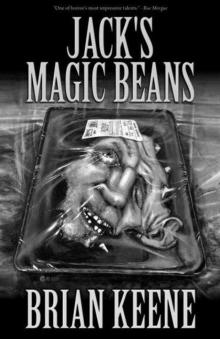 Jacks Magic Beans
Jacks Magic Beans Ghost Walk
Ghost Walk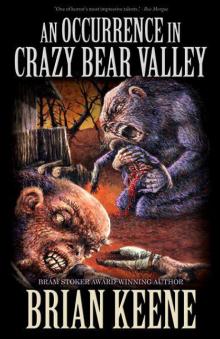 An Occurrence in Crazy Bear Valley
An Occurrence in Crazy Bear Valley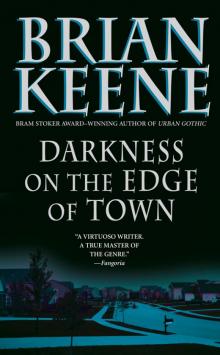 Darkness on the Edge of Town
Darkness on the Edge of Town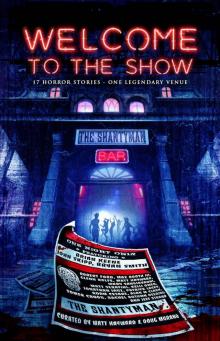 Welcome to the Show: 17 Horror Stories – One Legendary Venue
Welcome to the Show: 17 Horror Stories – One Legendary Venue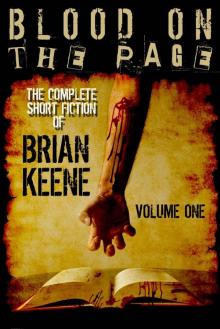 Blood on the Page: The Complete Short Fiction of Brian Keene, Volume 1
Blood on the Page: The Complete Short Fiction of Brian Keene, Volume 1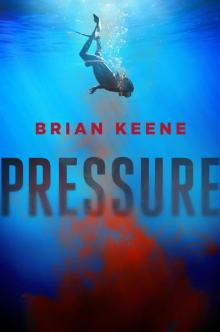 Pressure
Pressure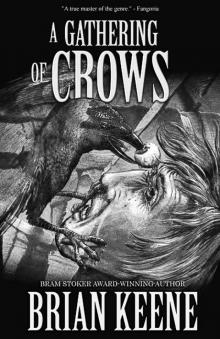 A Gathering of Crows
A Gathering of Crows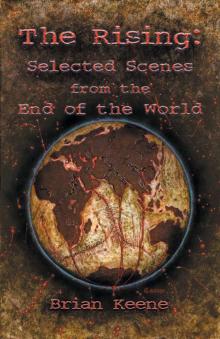 The Rising: Selected Scenes From the End of the World
The Rising: Selected Scenes From the End of the World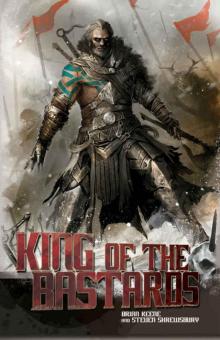 King of the Bastards
King of the Bastards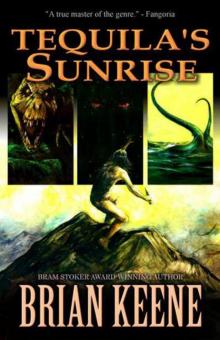 Tequila's Sunrise
Tequila's Sunrise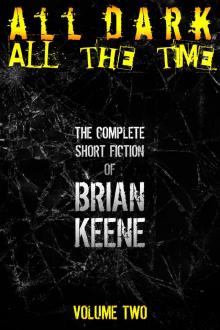 All Dark, All the Time
All Dark, All the Time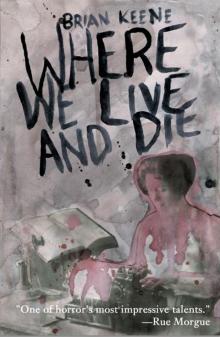 Where We Live and Die
Where We Live and Die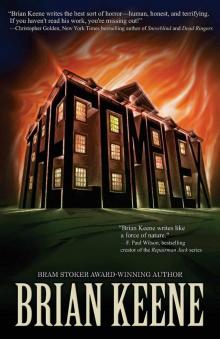 The Complex
The Complex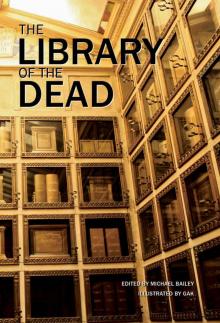 The Library of the Dead
The Library of the Dead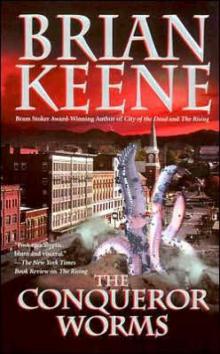 The Conqueror Worms
The Conqueror Worms The Girl on the Glider
The Girl on the Glider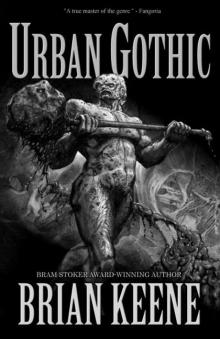 Urban Gothic
Urban Gothic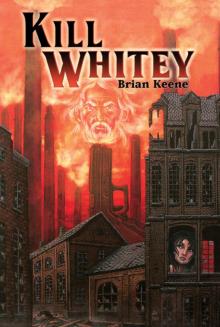 Kill Whitey
Kill Whitey Terminal
Terminal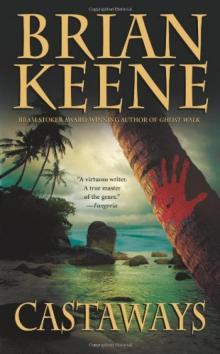 Castaways
Castaways